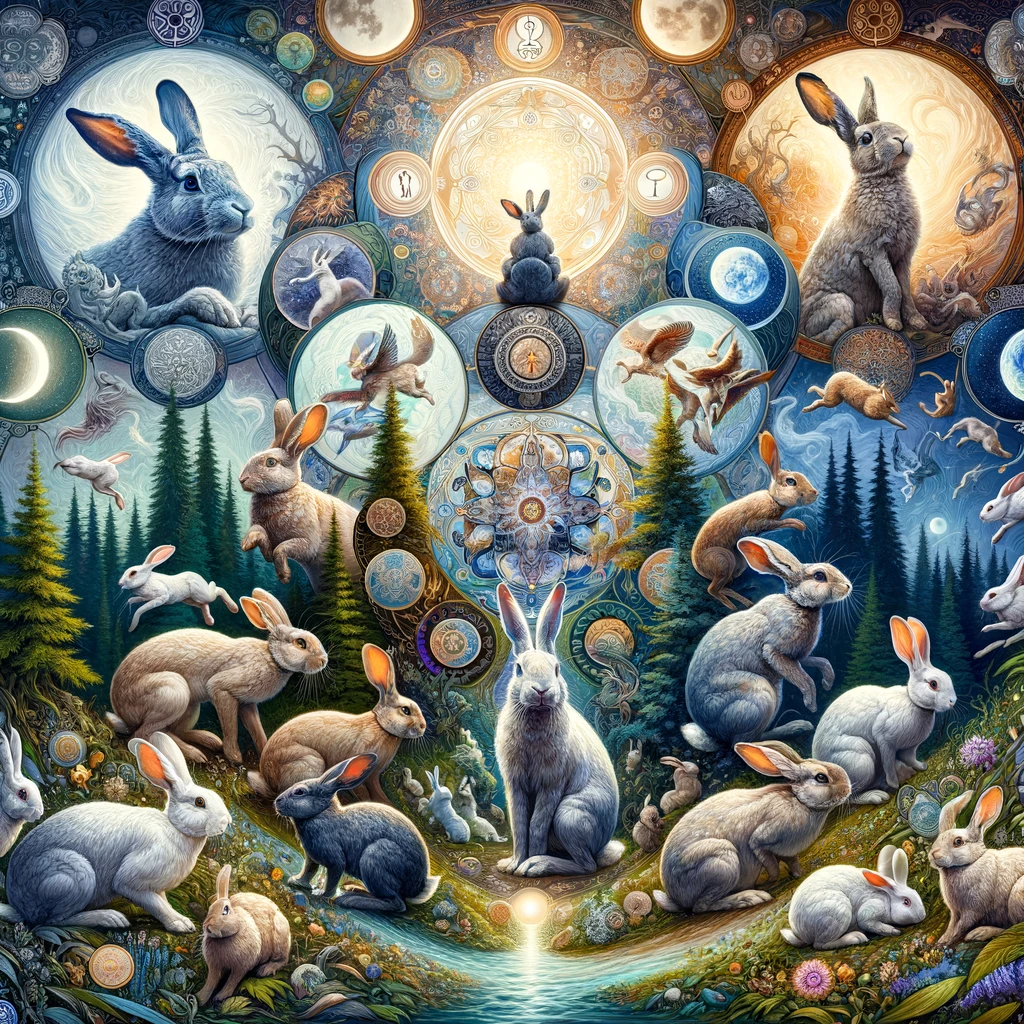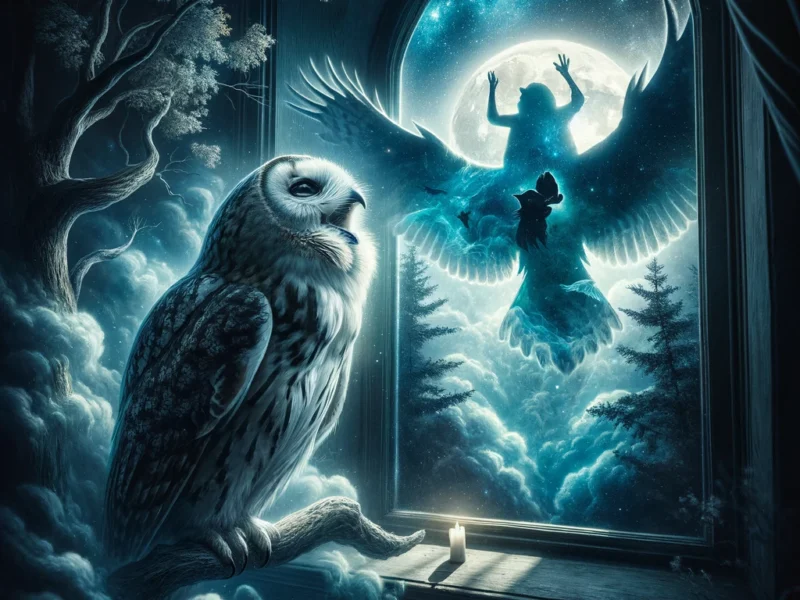Few other animals are laden with such multifaceted spiritual symbolism across cultures as the ubiquitous rabbit. These long-eared lagomorphs have represented everything from deception and cowardice to amazing fertility, rebirth, and luck for millennia. Let's delve into the rich, dualistic meanings of this unassuming creature.
"Rabbit's tale? Or a tale of paradoxes - fragility and abundance, fear and fertility, trickster and harbinger of prosperity?"
the key takeaway
Rabbits carry rich, multifaceted symbolic meanings across many cultures and spiritual traditions throughout history. At their core, rabbits represent the paradoxical duality and cycles of nature itself. On one side, they are powerful emblems of abundant fertility, renewal, luck, and new beginnings celebrated for their seemingly miraculous reproductive abilities. However, rabbits also symbolize more negative associations like deception, cowardice, vulnerability, and destructive voracity as prolific breeders. This dichotomy of rabbits signifying both the vibrancy of life and its fragility perfectly captures the paradoxes of the natural world. Rabbits embody the interconnected realities of abundance and scarcity, creation and deterioration, vigor and meekness. Their enduring spiritual symbolism serves as a reminder to appreciate the regenerative possibilities of existence while also respecting its inevitable cycles of decline and renewal. Few other animals so thoroughly represent the intriguing contradictions and precarious balances inherent to nature and the mysteries of life itself.
Rabbits in Ancient Civilizations
Some of the earliest mystical rabbit associations emerged from ancient Egyptian mythology. The rabbit or hare was closely tied to the moon, acting as a symbol of rebirth, renewal, and fertility. An Egyptian myth tells of the rabbit being celebrated as "the renewer of life" for its seemingly miraculous reproductive powers.
Folk anecdote: When the god Osiris was killed and dismembered, the divine rabbit gave its famously fecund abilities to Isis so she could use plant fertility to resurrect Osiris.
In Asia, rabbits held symbolic importance in Buddhism, Vedic traditions, and the Chinese zodiac. The lunar rabbit was seen as an emblem of longevity, procreation, and the cycle of rebirth in Buddhist cosmology. The Rabbit of the Chinese zodiac represented similar lucky, fertile meanings.
For Native Americans, the trickster rabbit or "Great Hare" frequently appeared in folklore as an archetypal figure embodying both clever deception and sacred spiritual significance. Rabbit symbolized timidity and vulnerability but also abundance, sexuality, and the circle of life.
Rabbits as Emblems of Renewal and Abundance
Today, rabbits remain inextricably tied to the symbolism of spring, renewal, fertility, and the blossoming of new life across many spiritual traditions and cultures.
Metaphor: As warm temperatures and vibrant hues burst forth each spring, so too do rabbits emerge from their winter slumbers - their spritely forms andprolific breeding mirroring nature's revitalization.
It's no wonder that rabbits, with their incredible reproductive capabilities, are seen as universal emblems of abundant fertility, virility, and sexuality. Rabbits' iconic abilities have even spun humorous anecdotes and adages about their ceaseless multiplying.
When rabbits appear as spirit animals or totems, they are viewed as representing:
- Humility, sensitivity, and awareness of one's environment
- Good luck, prosperity, and opportunitites for new beginnings
- Fertility, domestic bliss, and nurturing motherhood
These lucky bunny archetypes have persisted in modern literature/media like:
- Rabbit heroes in folklore (Brer Rabbit, Buddhist tale of the Rabbit in the Moon)
- The "fortune" of the March Hare and White Rabbit in Alice's Adventures in Wonderland
- The March symbols used by abortion rights and LGBTQ+ groups
The Paradoxical Rabbit's Duality
However, the rabbit also carries complex, paradoxical meanings across human spirituality. Yes, they symbolize abundant fertility and represent lucky chances for new beginnings. But rabbits are also associated with:
- Trickster qualities like deception, mischief, and cunning
- Fear, shyness, insecurity, vulnerability, and cowardice
- Voracity, destruction, and being prolific reproductive "pests"
This dichotomy of abundant life/renewal and fragility/crafty evasion results in rabbits carrying a versatile range of symbolic meanings in many faiths. Some key examples:
| Positive Rabbit Meanings | Negative Rabbit Associations |
|---|---|
| Luck, prosperity, new opportunities | Deception, trickery, mischief |
| Fertility, sexuality, abundant new life | Voracious reproduction, pest status |
| Humility, sensitivity to one's environment | Fear, timidity, cowardice |
While their fecund nature is celebrated, it also resulted in rabbits being labeled as crop-destroying nuisances in some folklore. Their cute but wary demeanor has spun both perceptions of sensitivity and skittishness.
Rabbits - Embodying Nature's Paradoxes
At their symbolic core, rabbits embody the paradoxical duality of nature's abundance and fragility, creation and deterioration, vigor and vulnerability. These conflicting states are not only interconnected in the ecological cycle but could be seen as two sides of the same coin of existence.
Ultimately, whether viewed as trickster symbols, lucky charms, or emblems of sexual and reproductive potency, rabbits have firmly maintained their prominent place across world spirituality for ages. Their lasting spiritual imprint stems from their mysterious duality that both celebrates life's regenerative possibilities and reveals its inherent and inevitable cycles of decline.
Few other modern bucolic symbols better capture the intriguing contradictions and precarious balances of the natural world. The rabbit's multifaceted archetypal essence endures as a reminder to appreciate life's vitality while respecting its fragility.
conclusion
Rabbits have traversed the depths of the human spiritual psyche for millennia, shapeshifting between embodying duality and singularity. While bearing the mantle of abundant life, renewal, and prosperity, their symbolism also represents deterioration, tricks, and fears.
This dichotomy is perhaps the truest reflection of the rabbits' spiritual essence. They are a microcosm of the natural world's paradoxes - where creation and disintegration, fecundity and fragility, boldness and meekness coexist in dynamically poised balance.
As we've explored, few other animals so thoroughly internalize the intriguing contradictions inherent to nature's cycles. The rabbit's spiritual archetype endures as an indelible reminder to appreciate life's regenerative wonders while respecting the delicate threads by which such vitality hangs.


